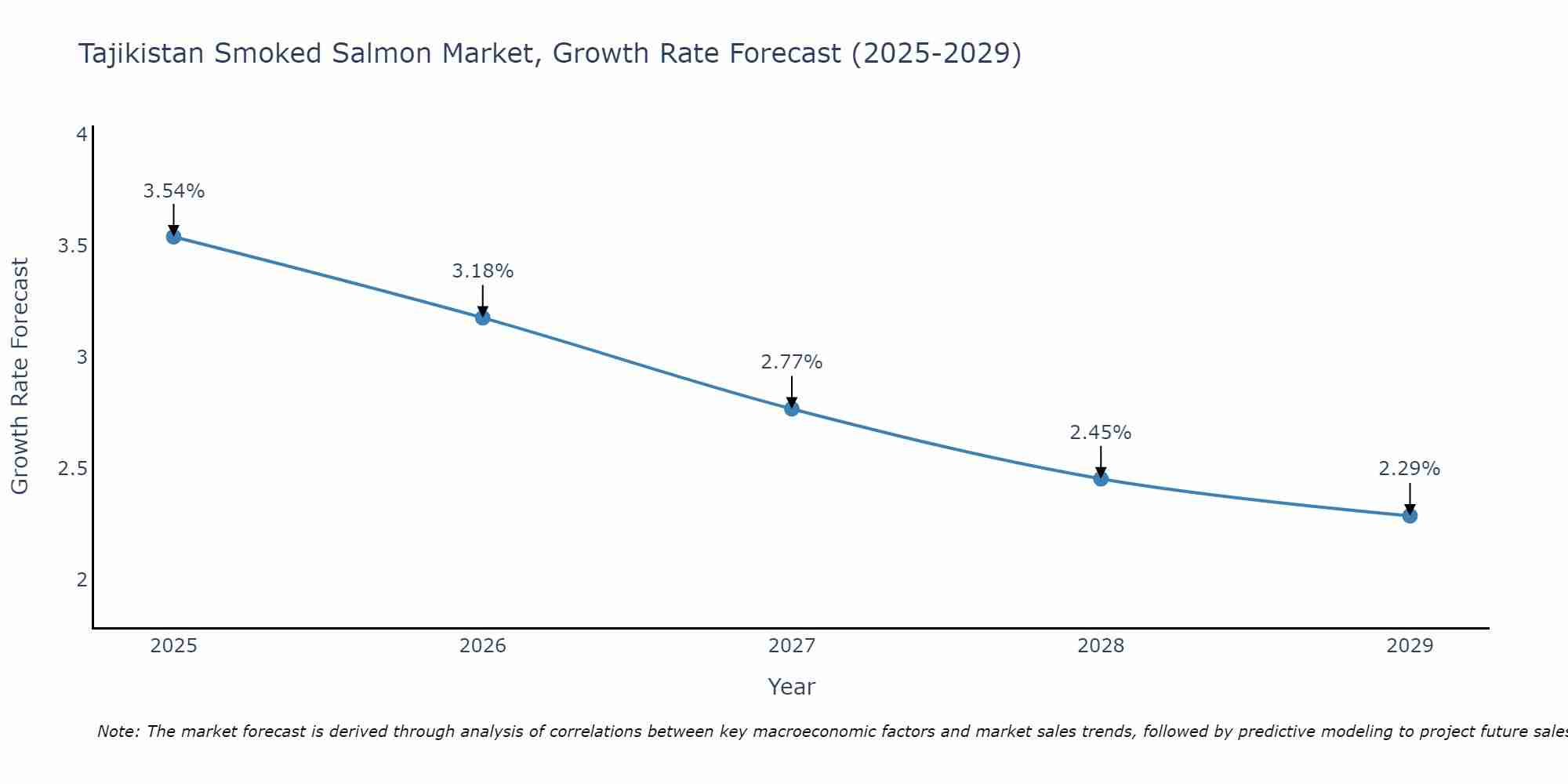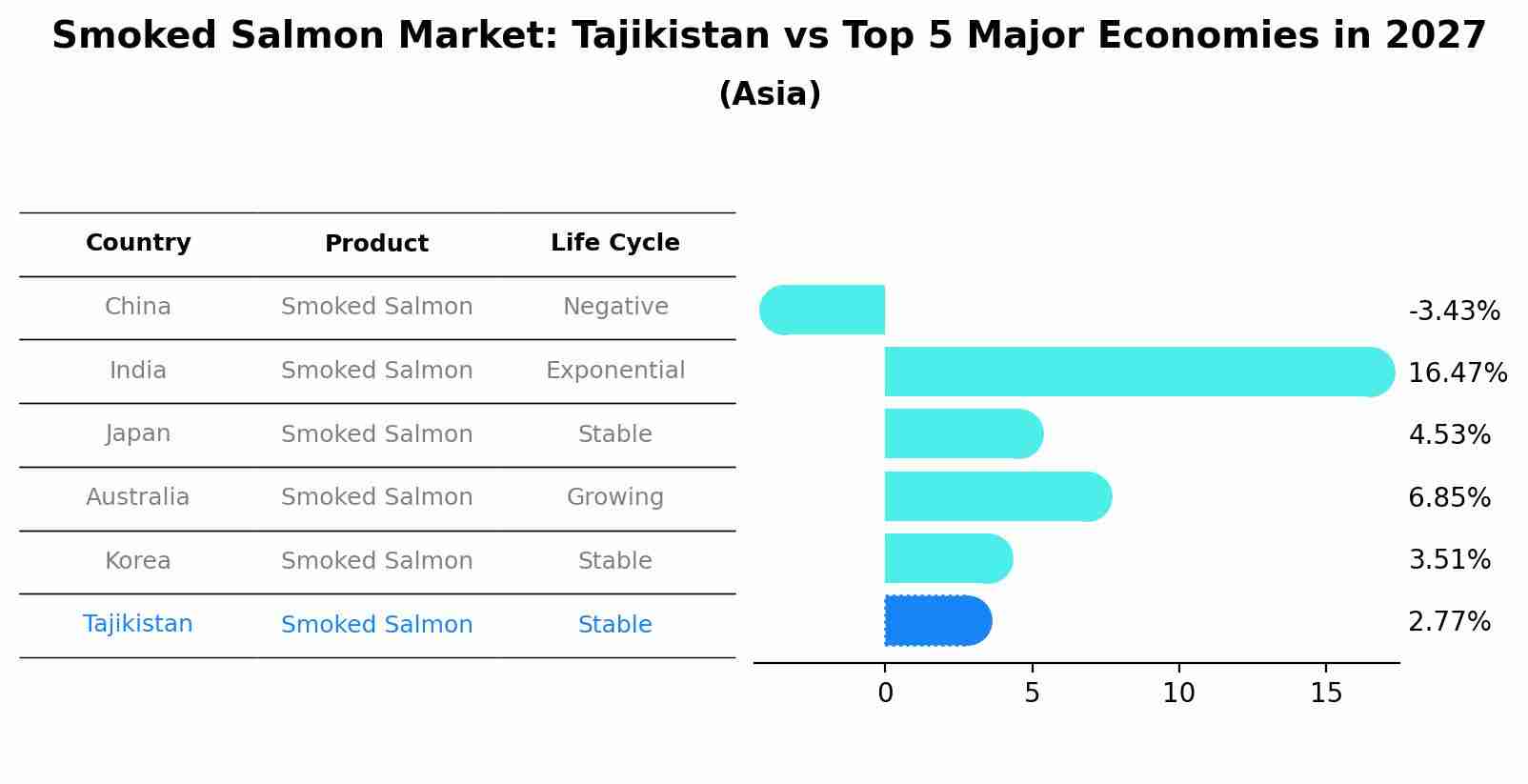Tajikistan Smoked Salmon Market (2025-2031) Outlook | Value, Growth, Share, Size, Trends, Forecast, Analysis, Revenue, Companies & Industry
| Product Code: ETC387899 | Publication Date: Aug 2022 | Updated Date: Jul 2025 | Product Type: Market Research Report | |
| Publisher: 6Wresearch | Author: Shubham Padhi | No. of Pages: 75 | No. of Figures: 35 | No. of Tables: 20 |
Tajikistan Smoked Salmon Market Size Growth Rate
The Tajikistan Smoked Salmon Market may undergo a gradual slowdown in growth rates between 2025 and 2029. Starting high at 3.54% in 2025, the market steadily declines to 2.29% by 2029.

Smoked Salmon Market: Tajikistan vs Top 5 Major Economies in 2027 (Asia)
Tajikistan's Smoked Salmon market is anticipated to experience a stable growth rate of 2.77% by 2027, reflecting trends observed in the largest economy China, followed by India, Japan, Australia and South Korea.

Tajikistan Smoked Salmon Market Synopsis
The Tajikistan Smoked Salmon Market is gradually expanding due to increasing consumer preference for healthier and gourmet food options. The demand for smoked salmon is rising in urban areas, driven by a growing awareness of the health benefits of seafood consumption. Local supermarkets and specialty stores are offering a variety of smoked salmon products sourced both domestically and imported from other countries. While the market is still relatively niche, there is potential for growth as Tajik consumers become more adventurous in their culinary choices and seek out premium food products. Key players in the market include both local producers and international brands looking to establish a presence in Tajikistan`s emerging smoked salmon sector.
Tajikistan Smoked Salmon Market Trends
In Tajikistan, the smoked salmon market is experiencing a growing trend driven by increasing consumer awareness of the health benefits and unique taste of smoked salmon. The demand for premium quality smoked salmon products is on the rise as more consumers are seeking healthier protein options and gourmet food choices. Additionally, the influence of global cuisine trends and the growing popularity of seafood in Tajikistan`s culinary scene are contributing to the market growth. To cater to this demand, local producers are expanding their product offerings and focusing on innovative flavors and packaging to attract a wider customer base. Overall, the Tajikistan smoked salmon market is poised for continued growth as consumers` preferences shift towards healthier and more diverse food options.
Tajikistan Smoked Salmon Market Challenges
In the Tajikistan Smoked Salmon Market, some challenges include limited availability of high-quality salmon due to geographical constraints and lack of local production facilities. Importing salmon can be costly and logistically complex, affecting pricing and overall competitiveness in the market. Additionally, consumer awareness and preference for smoked salmon as a premium product may not be fully developed, leading to potential market saturation or difficulty in establishing a loyal customer base. Furthermore, regulatory hurdles and trade barriers can impact the importation process, adding another layer of complexity for businesses operating in this market. Overall, addressing these challenges will require strategic planning, investment in infrastructure, and targeted marketing efforts to drive growth and sustainability in the Tajikistan Smoked Salmon Market.
Tajikistan Smoked Salmon Market Investment Opportunities
The Tajikistan Smoked Salmon market presents promising investment opportunities due to increasing demand for premium seafood products in the country. With a growing middle class and rising disposable income levels, consumers are seeking high-quality and healthy food options, making smoked salmon a popular choice. Investing in the Tajikistan Smoked Salmon market could be lucrative for businesses looking to capitalize on this trend and establish a strong presence in the market. Additionally, the export potential of Tajikistan`s smoked salmon to neighboring countries and beyond could further enhance the growth prospects for investors in this sector. Partnering with local suppliers and producers to ensure a sustainable and reliable supply chain can be a key strategy for success in this market.
Jordan Agar Market Government Policies
Government policies related to the Tajikistan Smoked Salmon Market focus on promoting sustainable fishing practices, quality standards, and export opportunities. The government has implemented regulations to ensure the protection of fish stocks and the environment to support the long-term viability of the industry. Additionally, quality control measures are in place to maintain high standards for smoked salmon production, including hygiene and processing requirements. The government also actively seeks to expand market access for Tajikistan smoked salmon through trade agreements and export promotion initiatives. Overall, these policies aim to support the growth of the smoked salmon industry in Tajikistan while safeguarding its sustainability and competitiveness in the global market.
Tajikistan Smoked Salmon Market Future Outlook
The future outlook for the Tajikistan Smoked Salmon Market appears positive, driven by increasing consumer awareness of the health benefits of seafood consumption and a growing trend towards premium and gourmet food products in the region. As the economy continues to develop and disposable incomes rise, there is a potential for increased demand for high-quality smoked salmon products. Additionally, the growing popularity of international cuisine and dining experiences in Tajikistan may further drive the demand for smoked salmon as a versatile and flavorful ingredient. However, challenges such as supply chain disruptions and competition from alternative protein sources could impact market growth. Overall, the Tajikistan Smoked Salmon Market is poised for expansion, offering opportunities for both domestic producers and international exporters to capitalize on the evolving consumer preferences in the country.
Key Highlights of the Report:
- Tajikistan Smoked Salmon Market Outlook
- Market Size of Tajikistan Smoked Salmon Market, 2024
- Forecast of Tajikistan Smoked Salmon Market, 2031
- Historical Data and Forecast of Tajikistan Smoked Salmon Revenues & Volume for the Period 2021 - 2031
- Tajikistan Smoked Salmon Market Trend Evolution
- Tajikistan Smoked Salmon Market Drivers and Challenges
- Tajikistan Smoked Salmon Price Trends
- Tajikistan Smoked Salmon Porter's Five Forces
- Tajikistan Smoked Salmon Industry Life Cycle
- Historical Data and Forecast of Tajikistan Smoked Salmon Market Revenues & Volume By Type for the Period 2021 - 2031
- Historical Data and Forecast of Tajikistan Smoked Salmon Market Revenues & Volume By Vac/Vacuum Packing for the Period 2021 - 2031
- Historical Data and Forecast of Tajikistan Smoked Salmon Market Revenues & Volume By Vac/Vacuum Packing Covered With Cardboard Envelope for the Period 2021 - 2031
- Historical Data and Forecast of Tajikistan Smoked Salmon Market Revenues & Volume By Canned Packaging for the Period 2021 - 2031
- Historical Data and Forecast of Tajikistan Smoked Salmon Market Revenues & Volume By Application for the Period 2021 - 2031
- Historical Data and Forecast of Tajikistan Smoked Salmon Market Revenues & Volume By Food Service Sector for the Period 2021 - 2031
- Historical Data and Forecast of Tajikistan Smoked Salmon Market Revenues & Volume By Retail Sector for the Period 2021 - 2031
- Tajikistan Smoked Salmon Import Export Trade Statistics
- Market Opportunity Assessment By Type
- Market Opportunity Assessment By Application
- Tajikistan Smoked Salmon Top Companies Market Share
- Tajikistan Smoked Salmon Competitive Benchmarking By Technical and Operational Parameters
- Tajikistan Smoked Salmon Company Profiles
- Tajikistan Smoked Salmon Key Strategic Recommendations
Frequently Asked Questions About the Market Study (FAQs):
- Single User License$ 1,995
- Department License$ 2,400
- Site License$ 3,120
- Global License$ 3,795
Search
Thought Leadership and Analyst Meet
Our Clients
Related Reports
- Afghanistan Apparel Market (2026-2032) | Growth, Outlook, Industry, Segmentation, Forecast, Size, Companies, Trends, Value, Share, Analysis & Revenue
- Canada Oil and Gas Market (2026-2032) | Share, Segmentation, Value, Industry, Trends, Forecast, Analysis, Size & Revenue, Growth, Competitive Landscape, Outlook, Companies
- Germany Breakfast Food Market (2026-2032) | Industry, Share, Growth, Size, Companies, Value, Analysis, Revenue, Trends, Forecast & Outlook
- Australia Briquette Market (2025-2031) | Growth, Size, Revenue, Forecast, Analysis, Trends, Value, Share, Industry & Companies
- Vietnam System Integrator Market (2025-2031) | Size, Companies, Analysis, Industry, Value, Forecast, Growth, Trends, Revenue & Share
- ASEAN and Thailand Brain Health Supplements Market (2025-2031) | Strategy, Consumer Insights, Analysis, Investment Trends, Opportunities, Growth, Size, Share, Industry, Revenue, Segments, Value, Segmentation, Supply, Forecast, Restraints, Outlook, Competition, Drivers, Trends, Demand, Pricing Analysis, Competitive, Strategic Insights, Companies, Challenges
- ASEAN Bearings Market (2025-2031) | Strategy, Consumer Insights, Analysis, Investment Trends, Opportunities, Growth, Size, Share, Industry, Revenue, Segments, Value, Segmentation, Supply, Forecast, Restraints, Outlook, Competition, Drivers, Trends, Demand, Pricing Analysis, Competitive, Strategic Insights, Companies, Challenges
- Europe Flooring Market (2025-2031) | Outlook, Share, Industry, Trends, Forecast, Companies, Revenue, Size, Analysis, Growth & Value
- Saudi Arabia Manlift Market (2025-2031) | Outlook, Size, Growth, Trends, Companies, Industry, Revenue, Value, Share, Forecast & Analysis
- Uganda Excavator, Crane, and Wheel Loaders Market (2025-2031) | Strategy, Consumer Insights, Analysis, Investment Trends, Opportunities, Growth, Size, Share, Industry, Revenue, Segments, Value, Segmentation, Supply, Forecast, Restraints, Outlook, Competition, Drivers, Trends, Demand, Pricing Analysis, Competitive, Strategic Insights, Companies, Challenges
Industry Events and Analyst Meet
Whitepaper
- Middle East & Africa Commercial Security Market Click here to view more.
- Middle East & Africa Fire Safety Systems & Equipment Market Click here to view more.
- GCC Drone Market Click here to view more.
- Middle East Lighting Fixture Market Click here to view more.
- GCC Physical & Perimeter Security Market Click here to view more.
6WResearch In News
- Doha a strategic location for EV manufacturing hub: IPA Qatar
- Demand for luxury TVs surging in the GCC, says Samsung
- Empowering Growth: The Thriving Journey of Bangladesh’s Cable Industry
- Demand for luxury TVs surging in the GCC, says Samsung
- Video call with a traditional healer? Once unthinkable, it’s now common in South Africa
- Intelligent Buildings To Smooth GCC’s Path To Net Zero


















